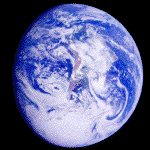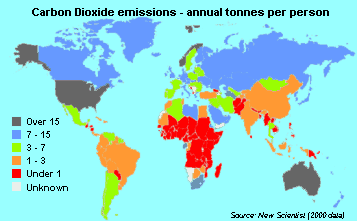GLOBAL WARMING

Global Warming is arguably the biggest environmental problem facing
humanity in the 21st century.
The Earth is heating up- the early warning
signs are everywhere. Human activity has been increasing the concentrations of
greenhouse gases into the atmosphere- mostly in the form of carbon dioxide from
the burning of fossil fuels (coal, gas, oil etc..) The Hydrocarbon economy has
increased the levels of carbon dioxide in the atmosphere from pre-industrial
levels of around 280 parts per million (ppm) to current levels of roughly 370
ppm on average worldwide. As of 2004, the Mauna Loa Observatory in the US State of Hawaii recorded a profound increase of 376 ppm to 379 ppm in just one year. This measure is expected to double by 2050 if current rates continue. Forecasters predict a 3-7 degree farenheit increase by the end
of the 21st century.
Since the 19th century, the mean temperature of the
earth has increased by about 1 degree farenheit. This has resulted in a dramatic
recession of the mountain glaciers of the world, a 40% reduction of the
thickness of the Northern Artic Ice pack over the past 4 decades, a global sea
level that has risen 3 times faster over the past 100 years than in the last
3000 years, a disruption of the Earth's hydrological weather cycle, and severe
flooding and drought conditions in certain parts of the world. Seven of the ten
warmest years in the 20th century have occured in the 1990's. 2001 was the
second warmest year on record.
Other effects of global warming include an
earlier than usual spring arrival, plant and animal range shifts and population
declines, coral reef bleaching, heavier than usual downpours, erratic snow pack
levels, flooding, droughts and fires and the spread of insect populations and
disease. Diseases relayed by mosquitos are among those eliciting the greatest
concern as the world warms. Malaria and dengue fever are two of the
mosquito-borne diseases most likely to spread dramatically as global
tempuratures head upward.
Since 2001, 165 nations around the world have
signed on to the 1997 Kyoto Protocols which would regulate carbon dioxide
emissions worldwide. The United States of America practically stands alone in
its refusal to sign onto the treaty. Since Kyoto, there have been almost yearly
Global Warming Summits that have brought about a level of success in working to
pull together an international consensus to set standards for reducing carbon
emissions worldwide.
The Intergovernmental Panel on Climate Change
established by the United Nations calculates that halting the ongoing rise of
atmospheric concentrations of greenhouse gases will require a 60- 70 percent
reduction of carbon emissions.
Contrary to the US Bush Administration's
recent move to open up the Caspian Sea/Kazakhstan oil fields- which are
purported to be the richest and most extensive (largest) oil reserves in the
world- the nations and peoples of the planet must learn to take command of their
own destinies and rapidly help transit our civilization out of the hydrocarbon
economy and move immediately towards a decentralized, non-polluting,
alternative/free energy based economy for the 21st century.
Steve Jones
P.O. Box 1141
Boulder, Colorado
80306
USA
E-Mail:
wahan779@yahoo.com

SOURCES:
1. NCAR- National Center for Atmosphertic Research
1850 Table
Mesa Dr
Boulder, Colorado
80305
USA
Website: http://www.ncar.ucar.edu/
2.
European Environment Agency
Kongens Nytorv 6
DK-1050
Copenhagen,
Denmark
European Union
Website:http://www.eea.eu.int/
3. Environmental
News Network (ENN)
2020 Milvia- #411
Berkeley,
California
94704
USA
Website: http://www.enn.com/
4. UNEP- United
Nations Environment Programme
United Nations Ave- Gigri
P.O. Box
30552
Nairobi, Kenya
AFRICA
Website:http://www.unep.org/
5. NOAA- National
Oceanic and Atmospheric Administration
14th and Constitution Ave-
NW
Washington, DC
20230
USA
Website: http://www.noaa.gov/
6. Union of
Concerned Scientists
2 Brattle Square
Cambridge, Massachussetts
02238
USA
Website:http://www.ucsusa.org/
7. Earth Island
Institute
300 Broadway- Suite 28
San Francisco,
California
94133
USA
Website:http://www.earthisland.org/
8.
World Resources Institute
10 'G' St- NE
Suite 800
Washighton,
DC
20002
USA
Website:http://www.wri.org/
9. New
Internationalist Magazine
55 Rectory Rd
Oxford, United Kingdom
OX4
1BW
European Union
Website:http://www.newint.org/
10. Global
Warming Information Center
International Headquarters
22W381, 75th
St
Naperville, Illinois
60565
USA
Website:http://www.globalwarming.net/
11.
Greenpeace International
Keizersgracht 176
1016 DW Amsterdam,
Netherlands
European Union
Website:http://www.greenpeace.org/~climate
12.
The End of Oil
Website:http://www.geocities.com/seraphim2017/oil.html
13. Movie- The Day After Tomorrow
Website: http://www.thedayaftertomorrow.com
14. ***Book- The Coming Global Superstorm
By Art Bell and Whitley Strieber
Website: https://www.angelfire.com/ms2/dreamland/books/superstorm.html
15. Anti-Gravity Propulsion
Website: http://www.geocities.com/sentinel8883
16. Woods Hole Oceanographic Institute
Coop Building, MS #16
Woods Hole, Massachussetts 02543 USA
Website: http://www.whoi.edu
17. Pew Center on Global Climate Change
2101 Wilson Blvd- Suite 500
Arlington, Virginia 22201 USA
Website: http://www.pewclimate.org
18. MIT Program on Science and Policy of Global Change
MIT Building, E40-428
77 Massachussetts Ave
Cambridge, Massachussetts 02139 USA
Website: http://web.mit.edu/globalchange/www
19. Strategic Environment Initiative(SEI)/Mission to Planet Earth
Website: http://www.geocities.com/sapphire2029/sei.html
20. Prophet's Links
Website: http://www.geocities.com/blueplanet774/master.html


URL of this site: http://gw7.20m.com




